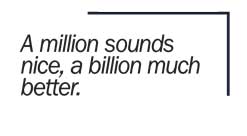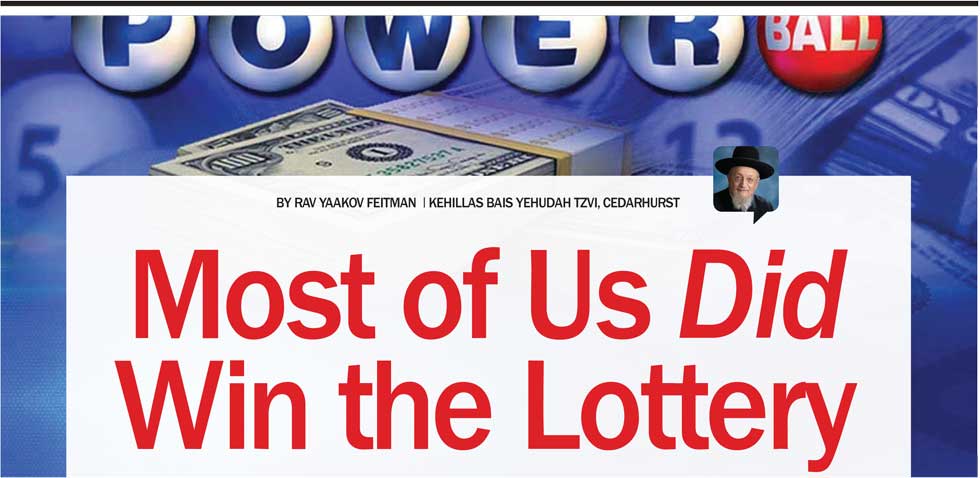Last week, millions of people considered themselves losers. Or at least not winners. An entire group that thought it had won found out that it was all a terrible mistake and cheers turned to their equivalent of kinnos. In conjunction with the spirit of Shabbos Shirah, I would like to suggest that cheers are in order for all of us who didn’t become overnight billionaires. That’s actually a wonderful thing, not as a consolation prize, but as the best possible news we could receive.
Before you skip to the next column of sagely advice, in protest, disbelief or frustration, please read on a bit, because it may change your day, hopefully for the better.
Shlomo Hamelech, the wisest man of all (Melachim I 5:11), who knew a bit about money (Koheles 2:4-10), had something to say about sudden wealth: “If an inheritance is seized hastily in the beginning, its end will not be blessed” (Mishlei 20:21). The Ralbag explains that “since an heir has not toiled for his prosperity, it will be relatively meaningless to him and he will squander it as rapidly as it was acquired.” The Malbim adds that “true lasting blessing only comes through hishtadlus – proper effort – not chance.”
Interestingly, we have an opportunity to experience this brachah from Hashem every day if we just pay a bit of attention. In the daily morning davening, we recite concerning the gift of sunlight, “Hame’ir la’aretz veladorim aleha berachamim – Hashem shines His light upon the earth and its inhabitants with compassion.” The Abudraham explained over six centuries ago that the sun doesn’t suddenly appear in all its glory. It rises and slowly increases in strength so that we may become accustomed to its radiance and can enjoy its brilliance. Imagine, he concludes, if everyone were suddenly blinded in the morning by the midday sun, how much different we would feel about its gentle rays, compared to now, when we have become accustomed to its warmth.
In truth, this metaphor is exactly how Chazal teach us the proper way to attain personal wealth. The posuk tells us about Yitzchok Avinu: “The man became great and kept becoming greater until he was very great” (Bereishis 26:13). The Medrash Rabbah immediately applies another of Shlomo Hamelech’s wise sayings: “The path of the righteous is like the glow of sunlight, growing brighter until high noon” (Mishlei 4:18). As Rav Aharon Levine zt”l concludes, “such is the way of instantaneous success, that it not only does not bring happiness to a person, but in the end it causes him great distress” (Hadrash Veha’iyun, Devorim, page 103).
Echoing these words of Chazal, there are apparently startling statistics about the vast number of lottery winners whose lives have been ruined by their “good fortune.” In the end, they are often worse off than before, ruing the day they once thought was the finest hour of their life.
There were actually two entire shevatim whom Chazal identify as paradigms of those who hastily seize good fortune. They were the tribes of Gad and Reuvein, who preferred the more immediate wealth of life in trans-Jordan to that of the mainland of Eretz Yisroel. As the Medrash Tanchumah (end of Mattos) teaches, “They loved their money… For this reason, they were the first to be exiled.” Rav Aharon Kotler zt”l (Mishnas Rebbi Aharon, Bamidbar 32 and Mishlei, page 250) explains that “on one level, they meant well, for they felt that this location would afford them an easy way to earn a living so that they could devote more time to Torah and avodas Hashem. Nevertheless, since their stated goal was to pursue material wealth at the expense of living near the center of Torah and kedushah, they eventually lost out.”
Rav Alter Chanoch Henach Leibowitz zt”l, rosh yeshiva of Yeshivas Chofetz Chaim, added another important thought. “Why,” asked Rav Leibowitz, “are we critical of the tribes of Gad and Reuvein? After all, no one else expressed any interest at all in these lands. Therefore, if anything, they were doing the rest of Klal Yisroel a favor. Furthermore, they had a number of noble considerations, including the holiness of this land, since Moshe Rabbeinu would be buried there (see Rashi and Seforno, Devorim 33:21). The answer is that they rushed too rapidly to acquire material wealth, failing to wait to share in the travails of their brothers who were fighting to conquer the main part of Eretz Yisroel” (Chiddushei Halev, Bamidbar, page 191).
Rav Eliyahu Eliezer Dessler zt”l (Michtav M’Eliyahu 2:257) also faults the Bnei Gad and Bnei Reuvein only for their haste, not so much their choice of real estate and domicile. “Why the rush?” asks Rav Dessler. “Why couldn’t they wait until they were commanded [where to live]?” This request on their part revealed a subtle but real obsession with olam hazeh, this world, which found expression in mentioning their cattle before their children.
A profound source for this attitude toward work and avoiding “easy money” may be found in a commentary of the Maharal. Rabbon Gamliel teaches us in Pirkei Avos (2:2), “Torah study is beautiful with derech eretz, because yegias shneihem meshakachas avon, toiling in both makes one forget to sin.” Although the phrase derech eretz bears numerous interpretations, the Maharal (Derech Chaim, Hartman ed., page 518) defines it only as “what a person requires for his material needs and livelihood.” Based upon this translation, the Maharal goes on to declare that “it is appropriate for man to toil in both areas of life [the physical and the spiritual]. The Torah represents sheleimus hanefesh, perfection of the soul, and derech eretz represents what is needed for the body for its parnassah.”
Rabbi Hartman, in his footnotes (251-254), refers to the Maharal’s own words elsewhere in Derech Chaim (Perek 3, Mishnah 3): “Since Hashem is our King, He provides us with sustenance like every earthly king. However, since He is also the Heavenly King, He provides for the needs of the soul as well.” The Maharal here goes on to conclude that although Hashem is the great Provider for both our spiritual and physical needs, we must do our part in each of these areas with our yegiah, toil and effort. This, too, alerts us to the conclusion that even in parnassah, there are hashlamos (roughly: “improvements”) that are accomplished through hard work.
Perhaps we can understand all this more clearly with the profound words of Rav Yeruchum Levovitz zt”l, the pre-war mashgiach of the Mirrer Yeshiva, who calls the following a “sod gadol, a “great secret,” which goes to the heart of the creation of the world. He quotes one of the earliest commentaries of Rashi (Bereishis 1:1) that Hashem initially wanted to create the world with middas hadin, the trait of pure justice. Although He eventually added the middah of rachamim, compassion, some aspects of the original plan remained. One of these “remnants” is the fact that “this is a world of s’char, reward and payment, not a world where anything is for free” (quoted in Oros Hamussar, page 53). This penetrating insight may explain why one should not long for large lottery winnings or unearned profits and lucre from sources that cannot be considered hard work. One way or another, we must all share in the primal din of the world. It is best to fulfill it through honest hard work than, G-d forbid, other forms of Divine justice.
It would seem appropriate to end this discussion with a story and thought from Rav Yechezkel Abramsky zt”l, although it is usually used for a different lesson (see Drashos Mishmar Halevi, page 45, and the Uvo Sidbak commentary to Mesilas Yeshorim, page 275). Rav Abramsky related noticing that on Rosh Hashanah and Yom Kippur, many people cry “rivers of tears” during the moving words of “Adam yesodo mei’afar vesofo le’afar – A man’s origin is dust and his destiny is back to dust.” Rav Abramsky shared that he did not weep at all when reciting those words, because “they are simply fact, not a problem.” There is nothing to cry about. “However,” he continued, “I cry when I say the very next words, ‘benafsho yovi lachmo – at risk of his life he earns his bread.’ Very often, man wastes his soul seeking his bread. The deeper meaning of these words is that ‘at the expense of his soul, he earns his bread.’ We find ourselves diminished spiritually because we have lowered our standards at work. Surely this should be the moment of great sobbing.”
Of course, we would love to have an easier life. A million sounds nice, a billion much better. But if we haven’t won yet, maybe we should utter a sigh of relief. Our work lives afford us unlimited opportunities for self-improvement and kiddush Hashem. With the help of Hashem, what we earn honestly will be blessed so that it is sufficient for our needs. And more importantly, it will not endanger us spiritually in ways that we cannot even dream or fathom. We should think of every moment at work in the Maharalian terms of achieving the sheleimus we all seek. Mazel tov to all the lucky winners.








